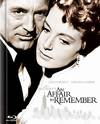





Movie Reviews
Films listed by Year | Films listed by Title | Films listed by Rank
| Movie Review: |
dir. Joseph
L. Manziewicz at 20th
Century-Fox |
ALL ABOUT EVE's greatness as a film starts with its script. Writer-director Joseph L. Mankiewicz manages to create an engaging story with memorable characters and tie them together with some of the sharpest dialogue ever to reach the screen. With a script this good, who needs actors? But EVE has them too, several in the roles that would come to epitomize their careers. Combine a fabulous script, several excellent performances, and production values that only enhance the story-telling, and you've got the basis for a pretty good film -- but somehow ALL ABOUT EVE manages to become just a little bit more. ALL ABOUT EVE is the story of an aging Broadway star named Margo Channing who takes in an ardent fan only to discover she's an aspiring actress with designs on Margo's stardom, roles, friends and life. On the surface, it appears to be a fairly typical story of insatiable ambition in the theatre, and even as such a typical story, it's a good movie. But EVE's brilliant dialogue and well-developed characters brought to life by a host of talented actors separate this film from other familiar backstage plotlines:
All these performances, lifted by Mankiewicz's dialogue and uninterrupted by the flow of his storytelling and direction, make ALL ABOUT EVE a very good film. But what makes EVE a great film is the fact that all this onscreen drama doesn't just take place to entertain the audience -- although entertain, it does. There are some significant issues raised in this film, and anyone telling you that Eve Harrington (the ingénue) and her acting ambitions are the focus of the film has missed the point entirely. The subject of this film is the eternal conflict in the lives of working women: marriage (or relationships) vs. career. Each of the three main female characters, Margo, Eve, and Karen, find themselves at a different point in this struggle:
ALL ABOUT EVE is a woman's picture, though not in the weepy or melodramatic sense usually associated with the term. It is a woman's picture because three leading characters struggle with themselves in an eternal female contest: personal fulfillment through career achievement or through relationships. (Although men too struggle with this issue on some levels, it has never been the same, because society never asks men to chose between career and family, only to find the right balance; whereas women are forced to chose between marriage and a career, the conventional wisdom -- then and now -- being that successful participation in both at the same time is impossible.*) What distinguishes ALL ABOUT EVE from other women's films however, is the fact that the surface story of treachery and ambition is sufficiently entertaining in itself for the rest of the audience, thanks to the superior writing and acting with which this film is blessed. Although some in the audience might miss the greater significance of the film (which transports it from the "good" to "great" category), they won't be bored; while those who do see the meaning will be as impressed with its insight as with its other more obvious aesthetic qualities. *Note that Meriam Webster's Collegiate Dictionary defines career as "a field for or pursuit of consecutive progressive achievement especially in public, professional, or business life", as opposed to a job which is defined as "a regular remunerative position". Thus, an essential difference between a career and a job is that a career has an upward trajectory while a job remains relatively static. More than just performing a "regular" task, a career involves striving for advancement and promotion in ones field and hence, demands a greater degree of focus, commitment and involvement. The position assumed in this argument is not that women cannot successfully balance work and marriage. Married women and mothers have held jobs outside the home for centuries. The "eternal" conflict addressed here is about women who try to balance marriage (or family) and a career, a much more ambitious undertaking. Reviewed: January 5, 2001 |
|
Visit the ALL ABOUT EVE section. Films listed by Year | Films listed by Title | Films listed by Rank |
| Now in Print! |
|---|
| Now on DVD! |
|---|
Buy Videos & DVDs |
|
Buy Movie Posters |
|
Buy Movie Posters |
|
Classic
Movie Merchandise |
|
![]() Printer-friendly version.
Printer-friendly version.
![]() Return
to the top.
Return
to the top.
Last updated:
March 10, 2011.
Reel Classics is a registered trademark of Reel Classics, L.L.C.
© 1997-2011 Reel Classics, L.L.C. All rights reserved. No
copyright is claimed on non-original or licensed material.
Terms of Use. Privacy Policy.









